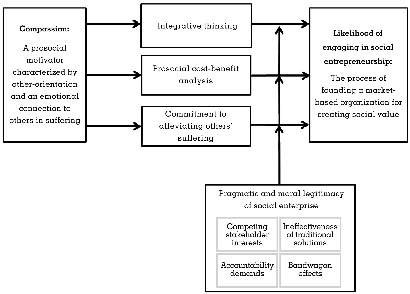By Web Communications
Article originally appeared on IEDP
When Professor Muhammad Yunus, the father of ‘microcredit,’ founded the Grameen Bank in 1976, to help millions of people in poor communities access small loans, he based the enterprise on sound banking principles. Commercially viability was essential, but the prime purpose was to help people escape poverty and Yunus’ prime motivation was compassion.
Compassion has been the motivation for a growing army of successful social enterprises, over recent years, and social entrepreneurship has emerged as a major contributor in addressing many seemingly intractable social problems faced around the world. But what are the driving forces that make compassion and concern for others a motivator of social entrepreneurship? Given our current understanding of what motivates entrepreneurship, this concern for others makes social entrepreneurship theoretically problematic.
A problem deepened by the seeming incompatibility of the twin pillars of social entrepreneurship: a combination of market-based methodologies, usually associated with creating economic value, and with charity-based practices, where donors are promised indirect social returns that are achieved by creating social value.
Drawing on research on compassion and prosocial motivation, Timothy Vogus at Owen Graduate School of Management, Vanderbilt University, Matthew Grimes from Alberta University, and Toyah Miller and Jeffery McMullen from Indiana University have developed a conceptual framework for understanding how compassion encourages social entrepreneurship and under which institutional conditions this is most likely to happen.
Under normal circumstances many things can motivate individual entrepreneurs to take on the risk, costs, and uncertainty associated with starting up a new enterprise: a desire for personal achievement, disaffection with mainstream employment, a need for autonomy or variety, and economic reward (though research suggests entrepreneurs exhibit a preference for nonpecuniary rewards).
This research reveals how social entrepreneurs move beyond these self-interested motivators and how compassion, through concern for others, acts as a prosocial motivator of cognitive and emotional processes that are preconditions for undertaking social entrepreneurship. These processes include (1) increasing integrative thinking, (2) inducing prosocial judgments regarding the costs and benefits, and (3) fostering commitment to alleviate others’ suffering.
While acknowledging that these processes in isolation do not sufficiently predict social entrepreneurship, the researchers say, when used in institutional settings that are perceived to be conducive to social entrepreneurship, such processes increase its likelihood.
Integrative thinking
The concept behind ‘integrative thinking’ is that rather than framing decisions as ‘either/or’ binary choices they should be approached in a flexible and holistic way bringing together elements of competing views to reach solutions. Compassion encourages individuals to be more receptive to diverse information and new approaches for solving problems, and this greater openness to different ideas allows for more integrative thinking about solutions.
Costs and benefit analysis
Entrepreneurs are traditionally motivated by self-interest, choosing to engage in activities where the personal benefits outweigh the personal costs and the economic benefits are clear. With social entrepreneurship, the economic benefits are low, the risks are high, and the personal benefits unknown. Given a normal, rational, cost-benefit analysis a social enterprise would be a non-starter.
Timothy Vogus and colleagues argue that the concern for others and the emotional nature of compassion challenges the traditional analysis of the costs and benefits of possible actions, and that compassion results in a more prosocial cost-benefit analysis where the benefits of acting to help others or alleviate suffering outweighs personal and economic benefits.
Commitment to alleviate others’ suffering
The researchers argue that a commitment to helping others – people living in poverty or in conditions of suffering – encourages individual entrepreneurs to devote more time and energy to creative and flexible thinking, than if they were making decisions to benefit only themselves. The emotional connection to others’ suffering can also positively affect a person’s sense of self-worth and sense of identity.
The flipside to this is that higher levels of commitment to alleviating others’ suffering can cause poor decision making, where individual social entrepreneurs can as a consequence become less responsive to any information that challenges his or her beliefs in the feasibility or viability of the social enterprise.

How Compassion Encourages Social Entrepreneurship
For these three processes and to encourage individuals to engage in social entrepreneurship, the researchers say, individuals need to see social enterprise as a legitimate organizational form. In recent years, institutional changes have led to both pragmatic and moral reasons for increased legitimacy. For example, the perceived growing distrust in government and social sector efforts to alleviate poverty, the growing need for transparency which can best be provided by market-based methods which provide measurable ‘proof’ of value creation, and the bandwagon effect of the media’s championing of social entrepreneurs, are all reasons for increased legitimacy.
Social enterprises can provide great social value. This research highlights how the very existence of social enterprises as an organizational form requires recognition that the motives of social entrepreneurs may be more complex than originally thought, being influenced as they are by some hitherto overlooked emotions like compassion.
Access the research paper: Venturing for Others with Heart and Head: How Compassion Encourages Social, Entrepreneurship, Timothy J. Vogus, Toyah Miller, Matthew G. Grimes, Jeffery S. McMullen, Academy of Management Review, Vol. 37, Issue 4, 2012